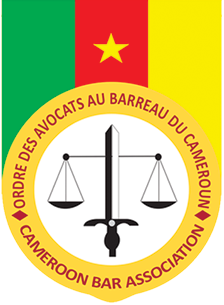ORGANIZERS:
JOINT VENTURE OF THE BRITISH HIGH COMMISSION, YAOUNDE AND THE CAMEROON BAR ASSOCIATION
DATE: 23 MARCH 2023
VENUE: HILTON HOTEL, YAOUNDE
DURATION: 10 AM TO 6 P.M.
ATTENDANCE: OVER ONE HUNDRED AND FIFTY (150) PARTICIPANTS
QUALITY OFPARTICIPANTS
- A MEMBER OF GOVERNMENT;
- HEADS OF DIPLOMATIC MISSIONS ACCREDITED TO CAMEROON, NOTABLY THE BRITISH HIGH COMMISSIONER TO CAMEROON AND HIS DEPUTY AS WELL AS THE AMBASSADOR OF THE FEDERAL REPUBLIC OF GERMANY TO CAMEROON;
- REPRESENTATIVES OF THE AFRICAN COMMISSION ON HUMAN AND PEOPLES’ RIGHTS AND THE AFRICAN COURT ON HUMAN AND PEOPLES’ RIGHTS;
- MEMBERS OF PARLIAMENT;
- STAFF OF THE MINISTRIES OF JUSTICE AND OF ECONOMY, PLAN AND REGIONAL DEVELOPMENT;
- -THE CAMEROON BAR ASSOCIATION LED BY ITS PRESIDENT;
- -ACADEMICIANS FROM STATE UNIVERSITIES AS WELL AS THE CIVIL SOCIETY;
Side Events: Group Picture, coffee and lunch breaks as well as the cocktail offered by the British High commissioner
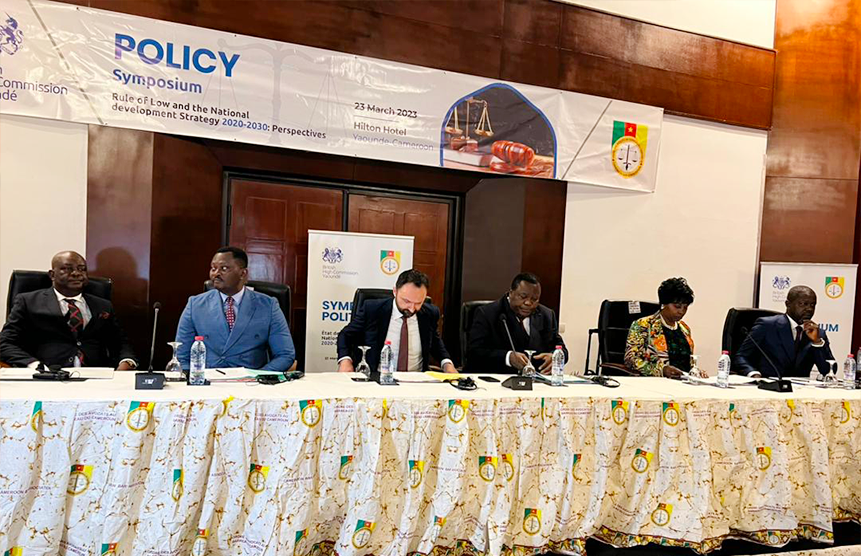

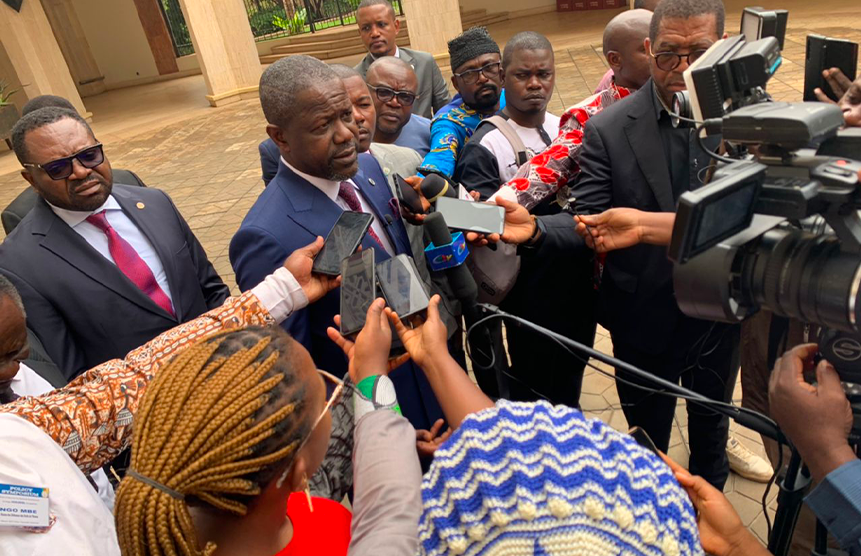
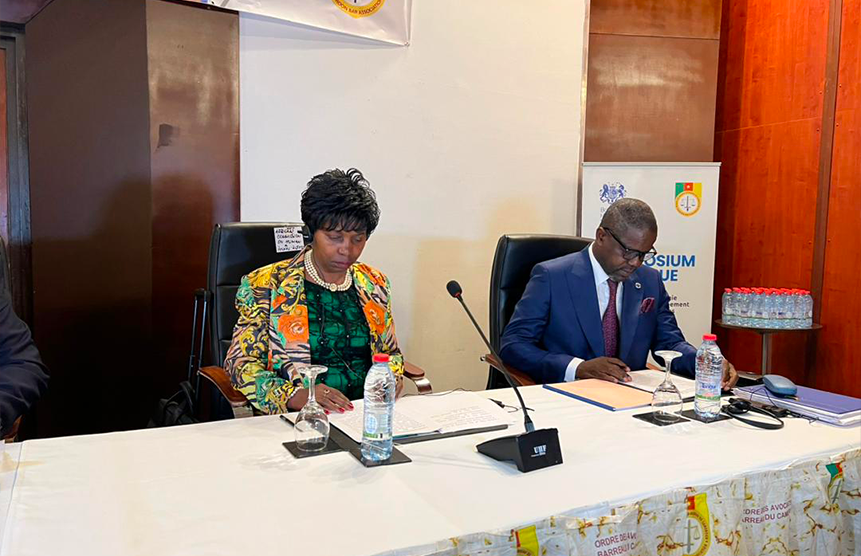
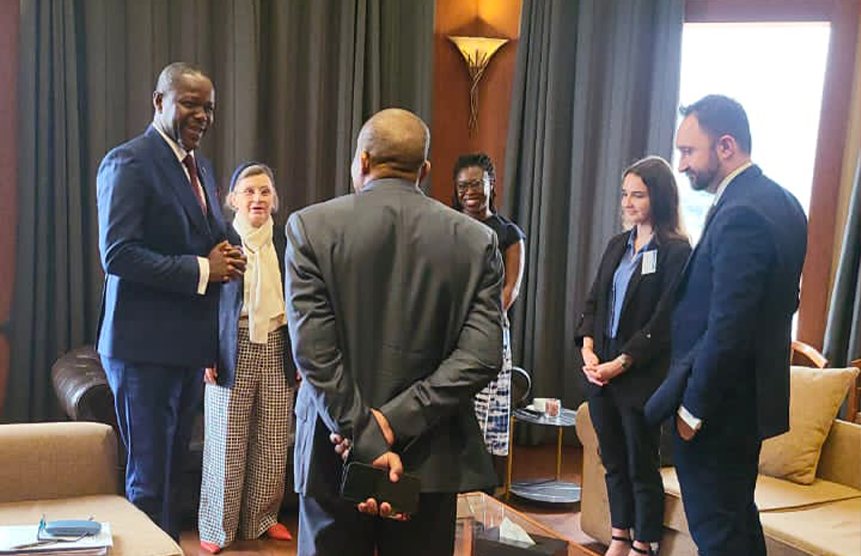
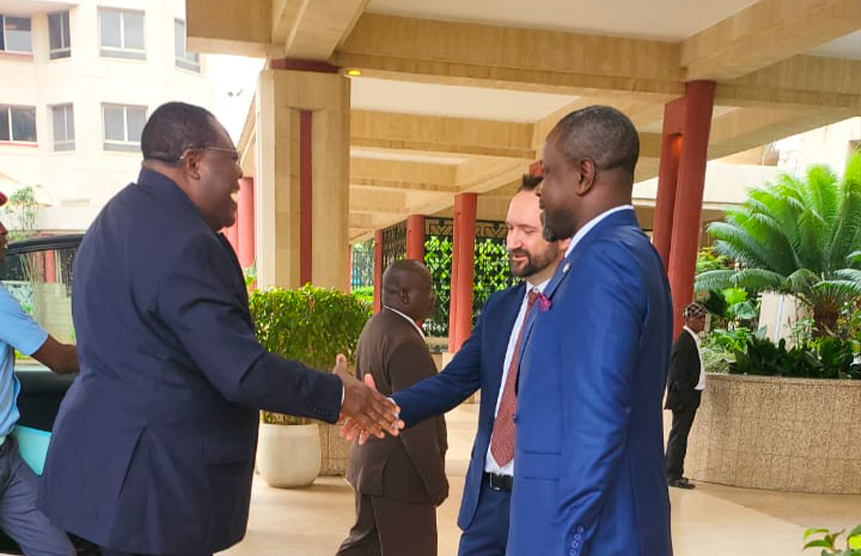
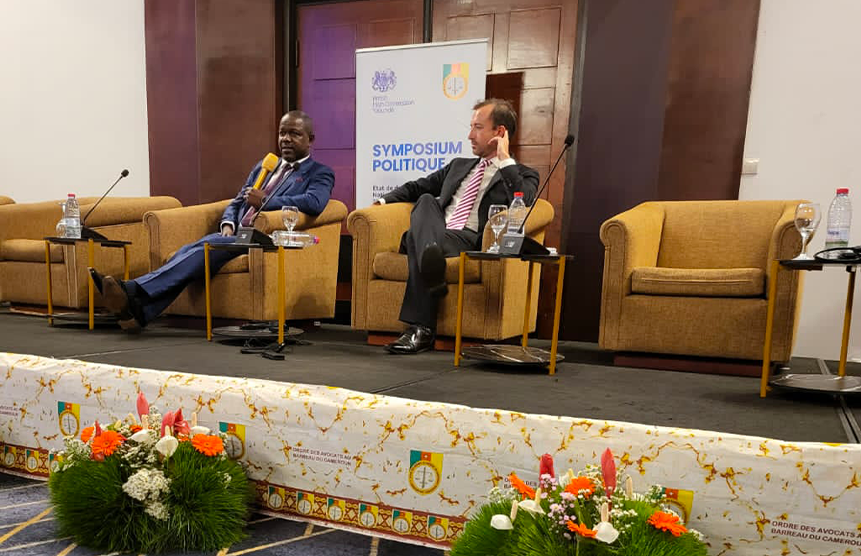
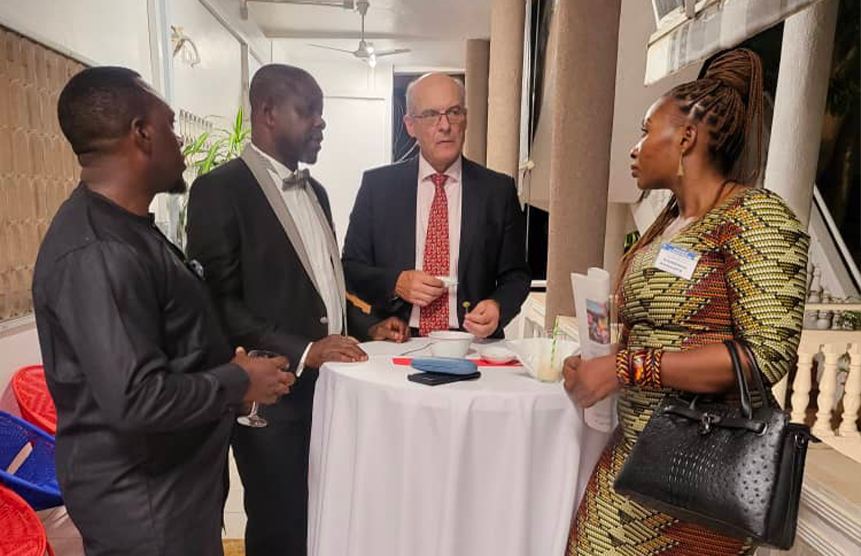
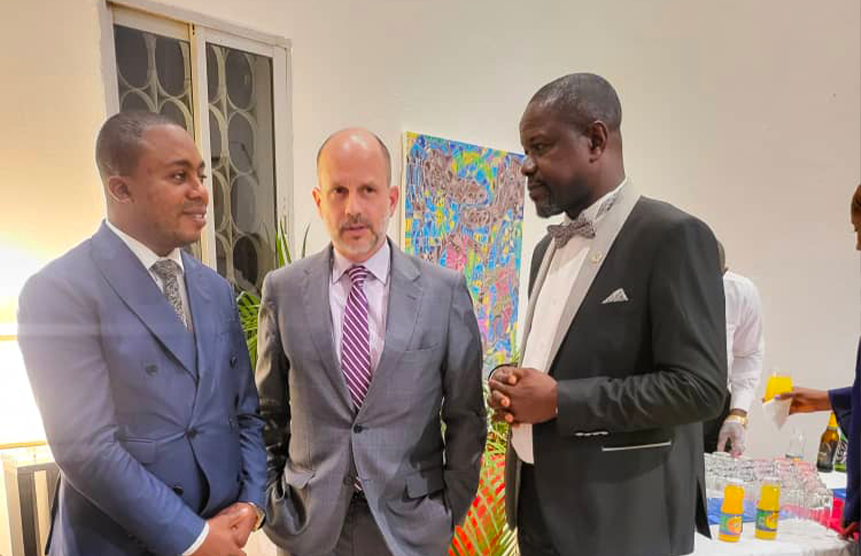
PART I PREPARATORY ACTIVITIES:
- Drafting of the concept paper;
- Exchanges between the Cameroon Bar Association and the British High Commission;
- Casting on panelists;
- Creation of a WhatsApp working group;
- Work session with panelists;
- Acquisition of logistics;
- Negotiations related to the host venue;
- Mobilization of the press;
- Preparation and distribution of invitation letters;
- Meeting with the panelists
II- SYMPOSIUM PROCEEDINGS
- Opening ceremony presided over by Jean De Dieu MOMO, Minister Delegate, Ministry of Justice, representative of the Minister of State, Minister of Justice, Keeper of the Seal
Speakers
i. Welcome remark by Lucas Owona, Mayor of the Yaounde III Council Area;
ii. Barister Mbah Eric Mbah, President of the Cameroon Bar Association, introduced the theme of the symposium. He eloquently defined the rule of law as a pillar of developpment.
According to the president of the Cameroon Bar Association, the concept of the rule of law owes its origin to the Magna Carta and the teachings of the renowned British Law Lord Albert Venn Dicey. This concept pleads in favour of the Supremacy of the law.
While recognizing efforts carried out so far by the goverment of Cameroon in the promotion of the rule of law, he regretted that this concept is scarred by significant short-comings in Cameroon; Corruption, interference in the Judiciary by the executive and lack of expediency in judicial proceedings constitute some of these short-comings. He hoped that the outcome of this symposium may help to overcome some of these hindrances and by so doing, greatly contribute to the promotion of the rule of law.
iii. Honorable Dr. Litha Musyimi – Ogana, Commissioner, African Commission on Human and Peoples’ Rights, representative of the chairperson of the African Commission on Human and Peoples’ Rights
While expressing gratitude for the invitation and warm welcome, she dwelled on the definition and importance to development of the rule of law. She stated with satisfaction, the consideration of the concept of the rule law in chapter six of the Cameroon National Development Strategy 2020-2030.This concept is equally contained in the preambular provisions of the Constitutive Act of the African Union as well as in Article (I) of the Protocol to the Treaty Establishing the African Economic Community Relating to the Pan-African Parliament (2001) ; the Protocol Relating to the Establishment of the Peace and Security Council of the African Union (2002): preambule as well as Article 3(f) , 4(c), 5(2) (g), 7(1)(m) and 14(1) of this protocol ; Article 7(5) of the Statute of the Economic, Social and Cultural Council of the African Union on Preventing and Containing Corruption (2003) ; Article 3(1) of the African Union Convention on Prevention and combatting corruption (2003) ; Article 26 (J) of the Africa Youth Charter (2006/2009) ; and most significantly, the 2007 African Charter on Democracy, Elections and Governance in its Article 2 (2)
She equally used the Jurisprudence of the African Commission on Human and People’s Rights: Article 19 Eritrea and Media Rights Agenda and others V. Nigeria.
She lamented over the non-implementation by States of most of the decisions of the African Union Commission.
iv. Eno Robert, Registrar of the African Court on Human and Peoples’ Rights, representative of the President of this Court.
He expressed the gratitute of the Court for the invitation, hoping that «…this is the start of a long-lasting relationship for the promotion and protection of human and peoples’ rights in the counrty. » He equally dwelled on the definition of the rule of law, gaining inspiration notably from the 1215 Magna Carta, the 1948 Universal Declaration of Human Rights, the UN Sustainable Development Agenda (SDG 16), the Constitutive Act of the African Union, the African Charter on Human and Peoples’ Rights, AU Agenda 2063, the 1996 Cameroon Constitution, amongst others.
He deplored the fact that, presently, only eight African States have deposited declarations accepting the jurisdiction of the Court in conformity with Article 34 (6) of its Protocol. This slow ratification pace hinders NGOs and individuals from initiating procedures in the court. Cameroon has not deposited its declaration. Cameroon acceded to the Court in 2015.Cameroon has its nationals serving in all the three human rights treaty-bodies of the Court: A Judge at the Court since 2016, the Registrar of the Court, a Commissioner serving with the African Commission in Banjul and an expert serving with the Committee of Experts on the Rights and Welfare of the Child. He challenged Cameroon to take pride in this and complete this feat by depositing the declaration.
v. Allocation by H. E Dr. Christian Dennys-Meclure, British High Commissioner to Cameroon
The British High Commissioner to Cameroon expressed his gratitude to all those who accorded a fovourable consideration to this symposium, notably the government, through the Ministry of Justice and the Cameroon Bar Association. He further decleared the willingness of the British High Commission to continue in supporting national initiatives towards the promotion of the rule of law and the implementation of the National Development Strategy 2020-2030.He expressed the wish for a successful symposium while expecting its positive impact on the rule of law in Cameroon as a pillar of the successful implementation of the National Development Strategy 2020 – 2023.
vi. Opening Remarks by Mr. Jean De Dieu MOMO, Minister Delegate, Ministry of Justice, representative of the Minister of State, Minister of Justice, Keeper of the Seal:
The Minister Delegate presented the National Development Strategy 2020-2030 (NDS30) as the successor of the 2010-2019 Growth and Employment Strategy Paper (GEPS).
He underscored the different components of the NDS30:
- A United and indivisible nation enjoying peace and security;
- A true, strong and fair democracy;
- A decentralized administration at the service of development;
- A prosperous economy based on sub-regional, regional and global integration;
- A controlled population growth;
- The promotion of gender parity in electoral processes and equality in elective positions;
- The social and economic empowerment of the woman;
- Emphasis on a stable and harmonious family;
- The provision of basic quality social services;
- The Independence and accessibility of the judiciary;
- The reduction of poverty, illitracy and social exclusion rates;
- Rendering attractive the Cameroonian culture, united in diversity and assertive at the international level;
- The reduction of unemployment and underemployment rates;
- The training of youths; and
- A fair distribution of resources.
According to the Minister Delegate, the government underlines the promotion of the rule of law as a vector of an enabling environment for the achievement of the afore-listed goals.
In spite of government’s determination for the implementation of the rule of law, some significant hindrances prevail, notably related to lack of adequate infrastructure to the judiciary, grounded on inadequate financial resources.
He welcomed the initiative of organizing this symposium, indicating that his presence was testimony of goverment’s support and determination to promote the rule of law. While wishing that more of such symposiums should be organized, he expressed the government’s gratitude to the Cameroon Bar Association and the British High Commission for jointly organizing this symposium. Thereby, officially declaring the symposium open.
- Panel Discussions
Panel 1: The rule of law as a catalyst to development
Moderator: Barrister Yolande NGO MNYOGOG, Secretary-General, Cameroon Bar Association
- Topical presentations followed by exchanges
(a) Dr. Eno Robert presented on the interplay between development and the rule of law, notably in the domain of Human Rights.
He dwelled on the intrinsic relationship between development and the respect of Human Rights, underlying that the respect of the rule of law inevitably leads to development. To him, the independence of the judiciary is indispensable in the respect of the rule of law, and by extension, to development.
He used the jurisprudence of the African Court on Human and Peoples’ Rights in the case of Tangayika Law Society V. Tanzania to reinforce the cardinal prinicple of the rule of law which pleads in favour of freedom of association, thereby inviting African Governments to gain inspiration from this decision. This decision condemned the extant practice of investiture by political parties into political positions.
Dr. ENO Robert equally revealed that a decision of this Court constitutes the strength upon which the Ivorian Electoral Commission was re-constituted in favour of the respect of the principle of neutrality. He further emphasized on the necessity of the provision of legal aid to suspects of offences with heavy sentences.
The right to fair trial, an essential component of the rule law has also been reinforced by the African Court in the case of Robert Zongo V. Burkina Faso. In this case, the Court posited that states must conduct responsible and adequate investigations in cases involving serious offences such as murder and Treason.
(b) Dr. Ashu Nyenty underscored the importance of some corner stone principles of the rule of law:
- The independence of the judiciary and the impartiality of the judges;
- Access to justice, noting that no registration fees are needed for complaints both by the courts and Labour Inspectors in Cameroon;
- The Clarity of the Law;
- Supremacy of the law is reflected in article 75 of the 2016 Cameroon Penal Code which provides that ignorance of law in no excuse;
- The availability of the law, regretting that laws are hardly published in Cameroon due to the dormant nature of the official gazette and that court records are not equally published;
- The equality of all citizens before the law;
- The reasonable exercise of public power; and
- The dislocation between politics and the law.
(c) Barrister Evaristus Morfaw dwelled on the reluctance of Cameroonian lawyers to assist suspects without legal counsel because of lack of financial motivation and unscrupulous means of designation of legal counsellors by the judges. He pleaded for an amelioration of this situation as a means of promoting the rule of law in Cameroon.His presentation focused on an equitable legal proceeding as a catalyst to development.
Panel 2: Collaboration between regional machanisms and State Parties on non-contentious matters.
Moderator : Barrister Louisa Ngwe Songwe.
- Tropical discussions followed by exchanges
(a) Dr. Litha Musyimi – Ogana Overviewed existing African mechanisms involved in the promotion of the rule of law as well as adherence and participation of African States to these mechanisms. These mechanisms, include the Pan-African Parliament, the African Court on Human and Peoples’ Rights as well as the African Commission on Human and Peoples Rights. Added to these, are Civil Society Organizations and National Human Rights Commissions.
She indicated that article 2 of the African Charter on Human and Peoples’ Rights required Party States to report every 2 years to the Commission, noting that fifty-four (54) out of fifty –five (55) African States have ratified this Charter.She noted positively that Cameroon was up-to-date in relation to reporting. The Commission equally receives reports from NGOs under the rubrique of shadow reporting. She regretted the fact that most countries do not deposit the reports as required.
(b) Mr. FONKUI Fernand Duplex from the Ministry of Justice presented on the process of data collection on the human rights situation in Cameroon for reporting to regional mechanisms as well as the inclusive nature of this process. He dwelled on the collaboration between the Ministry of Justice and Civil Society Organizations in drafting annual reports on the Human Rights situation in Cameroon. The panelist indicated that the preamble of the Cameroon constitution provides for respect of Human rights as it makes mention of the African Charter on Human and Peoples’ Rights as well as the 1948 Universal Declaration on Human Rights. He further indicated that Cameroon has ratified the quasi-totality of existing regional conventions dealing with the rule of law. Consequently, the National Development Strategy 2020-2030 takes into consideration the Rule of law in its sixth sector. Since 2005, a department in charge of Human Rights and Cooperation exists in the Ministry of Justice. Equally, there exists an Inter-Ministerial Committee piloted by the Prime Minister, Head of Government which sits on decisions rendered by regional mechanisms involved in the promotion of the rule of law as well as dialogues with these mechanisms.
He highlighted the fact that Cameroon’s Head to State lays emphasis on the rule of law.
The panelist underlined consultations between the Ministry of Justice, the Cameroon Bar Association and the Civil Society in the drafting process of annual reports on Human Rights in Cameroon. The draft report in eventually consolidated and presented in English and French.It is finally validated by the Prime Minister, Head of Government
(c) Barrister Felix Agbor Nkongho attempted an overview of the role of the National Commission on Human Rights and Freedoms in the promotion of Human Rights and the rule of law in Cameroon. From the Civil Society point of view, he declared that this Commission contributes enormously to the enhancement of Human Rights in Cameroon. The Commission constitutes an interface between Cameroon and the relavant regional mechanisms.
He regretted the fact that Cameroon does not implement the decisions of regional mechanisms such as the African Commission on Human and Peoples’ Rights citing, the unimplemented SCAPU/SCNC V.Cameroon 2009 case. He decried the lack of collaboration between the National Commission and the Civil society.
Barrister Agbor ended his presentation with a call to the Bar Association to continue to be a watchdog, advocate for the implementation of decisions from the African Commission. He encouraged members of the Cameroon Bar Association to develop interest in becoming parliamentarians in order to push for the adoption of good laws, thereby promoting the rule of law.
(d) Barrister Joseph Claude Biligha exposed on the role of lawyers in the collaboration between regional mechanisms and State Parties on non-contentious matters. He highlighted the fact that the afore mechanisms have both contentious and advisory roles. He advocated for the involvement of notaries in the creation of an enabling legal environment for the implementation of the NDS30, while highlighting the fact that the judicial chain is only complete upon the execution of judgements. He indicated the negative effects of corruption on the NDS30.In this light, he regretted the non-creation of the National Anti-corruption Committee proposed in 2009 by lawyers, during a meeting in Douala.
He emphasized on the importance of involving the Bar Association and Notaries in the collaboration between regional mechanisms and State Parties on non-contentious maters, which for now is insufficient, if not inexistent.
(e) Another panelist Dr. Frederic Foka Taffo, conducted a review of Cameroon’s participation in the African Commission on the Right of the Child. He noted with dissatisfaction the non-conformity of National laws to international conventions in this domain. Furthermore, he revealed that Cameroon is noted for non-implementation of the African Commission decisions as indicated by the cases of Pius Njawe v.Cameroon and the SCNC v.Cameroon. It was however satisfactory to note the creation of the National Communication Council and the National Commission for the Promotion of Bilingualism and Multiculturalism, institutions which greatly reflect the political will of the government for regulated press freedom and social cohesion, essential components of the rule of law.
- The way forward in the promotion of the rule of law in Cameroon as a condition sine qua non for the implementation of the National Development Strategy 2020-2030
Following exchanges between the panelists and participants, some proposals were made in order to promote the rule of law in Cameroon and by so doing, contribute in creating an enabling legal climate for the implementation of the NDS30:
- The Cameroon Bar Association and the Civil Society should intensity advocacy for Cameroon to deposit its declaration of acceptance of the jurisdiction of the African Court of Human and Peoples’ Rights, thereby accepting the jurisdiction of the Court;
- The government should review the legal fees of defense counsels chosen by the courts to defend suspects who do not have personal lawyers, noting that the current fees are ridiculous (5.000frs CFA per court session). This will greatly encourage lawyers in the implementation of the right to legal assistance of suspects;
- The Cameroon Bar Association was called upon to constitute American-styled Pro-Bono Counsel services in favour of suspects of serious offences not in possession of legal counsels. This could be achieved by seeking financial assistance from partners:
- Notaries must be involved in the strive for the promotion of the rule of law, considering that a legal process can only be complete upon the execution of the judgement;
- Inspired by the ECOWAS model, it was proposed that the decisions of regional mechanisms should be accorded direct legal value like that of National decisions;
- The Cameroon Bar Association must continue to advocate for the promotion of the rule of law
- More consultations among the various stake holders should be organized
The symposium ended with closing remarks from the President of the Cameroon Bar Association and the British Deputy High Commissioner to Cameroon His Excellency Nigel Holmes.
Madame La Secrétaire de l’Ordre
Me NGO MINYOGOG Anne Yolande
